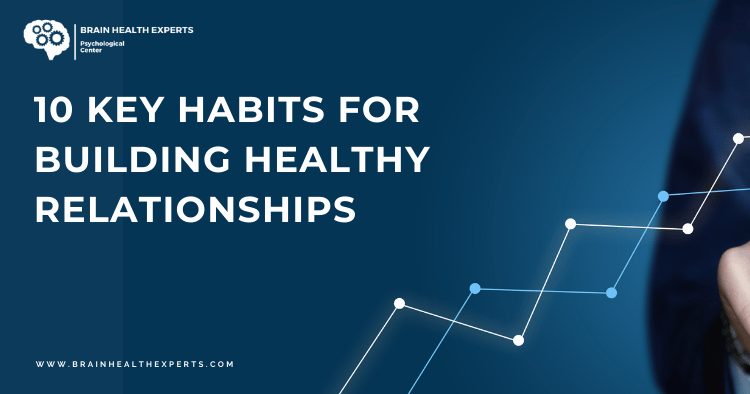Table of Contents
- Introduction
- 1. Effective Communication
- 2. Active Listening
- 3. Trust Building
- 4. Empathy and Understanding
- 5. Setting Boundaries
- 6. Quality Time
- 7. Conflict Resolution
- 8. Appreciation and Gratitude
- 9. Support and Encouragement
- 10. Flexibility and Adaptability
- Conclusion
- FAQs
Introduction
Building healthy relationships is essential for our emotional well-being and overall happiness. Whether it’s with friends, family, or romantic partners, the quality of our relationships can significantly influence our lives. In this article, we will explore 10 key habits for building healthy relationships that can help nurture connections and cultivate a supportive environment.
1. Effective Communication
Effective communication is the cornerstone of any healthy relationship. It involves not just speaking clearly but also expressing your feelings and thoughts honestly. Here are some tips to enhance your communication skills:
- Be Open and Honest: Share your thoughts and feelings without fear of judgment.
- Use “I” Statements: Frame your feelings with “I” statements to avoid sounding accusatory. For example, “I feel upset when…” instead of “You make me upset when…”
- Avoid Assumptions: Don’t assume you know what the other person is thinking. Always ask for clarification.
For more insights on effective communication, check out The Importance of Communication in Relationships.
2. Active Listening
Active listening is a skill that involves fully focusing on the speaker, understanding their message, and responding thoughtfully. Here’s how to practice active listening:
- Maintain Eye Contact: This shows the speaker that you are engaged.
- Nod and Use Verbal Affirmations: Small gestures like nodding or saying “I see” can encourage the speaker.
- Reflect and Clarify: Repeat back what you’ve heard to ensure understanding. For example, “So what you’re saying is…”
Active listening not only improves communication but also strengthens emotional bonds.
3. Trust Building
Trust is fundamental in any relationship. It fosters a sense of security and openness. Here are some ways to build trust:
- Be Reliable: Follow through on your promises and commitments.
- Be Vulnerable: Share your fears and insecurities to deepen the connection.
- Avoid Gossip: Keep conversations private and respect confidentiality.
For more on building trust, visit How to Build Trust in a Relationship.
4. Empathy and Understanding
Empathy is the ability to understand and share the feelings of another. It is crucial for building strong relationships. Practice empathy by:
- Putting Yourself in Their Shoes: Try to see situations from the other person’s perspective.
- Validating Feelings: Acknowledge their feelings, even if you don’t agree with them.
- Being Patient: Allow the person to express themselves fully without interruption.
Empathy not only enhances connection but also promotes emotional healing. For further insights, check out 10 Ways Positive Thinking Transforms Your Relationships.
5. Setting Boundaries
Healthy relationships thrive on mutual respect and understanding of personal space. Setting boundaries is vital for maintaining balance. Consider the following:
- Communicate Your Needs: Clearly express what you need from the relationship.
- Respect Others’ Boundaries: Be mindful of the limits set by others.
- Be Firm but Kind: When boundaries are crossed, address it calmly and assertively.
For further reading, check out The Importance of Setting Boundaries.
6. Quality Time
Spending quality time together strengthens relationships and fosters closeness. Here are some suggestions:
- Plan Regular Dates: Schedule time for each other to engage in fun activities.
- Disconnect from Technology: Put your phones away to be fully present.
- Engage in Shared Hobbies: Find interests you can enjoy together.
Quality time can significantly enhance your connection and understanding of one another. Also look for ideas on 10 Daily Habits to Boost Your Positive Mindset to integrate positivity into your shared experiences.
7. Conflict Resolution
Conflicts are inevitable in any relationship, but how you handle them can make a difference. Follow these steps for effective conflict resolution:
- Stay Calm: Take deep breaths before addressing the issue.
- Focus on the Issue, Not the Person: Avoid personal attacks and address the matter at hand.
- Seek a Win-Win Solution: Aim for compromises that satisfy both parties.
Learn more about conflict resolution strategies at Conflict Resolution Skills.
8. Appreciation and Gratitude
Expressing appreciation cultivates a positive atmosphere in any relationship. Here’s how to show gratitude:
- Verbal Affirmations: Tell them you appreciate their efforts.
- Small Acts of Kindness: Surprise them with a thoughtful gesture.
- Celebrate Accomplishments: Acknowledge their achievements, no matter how small.
Regular expressions of appreciation can foster a deeper emotional connection. Check out 10 Simple Gratitude Practices to Boost Positive Thinking for more ways to cultivate gratitude in your relationships.
9. Support and Encouragement
Being supportive is key to nurturing healthy relationships. Here’s how to be there for someone:
- Listen Actively: Offer your ears when they need to vent.
- Encourage Their Goals: Motivate them to pursue their dreams.
- Be There During Tough Times: Show up when they need you the most.
Support and encouragement can foster resilience and strengthen bonds. For additional insights, look into 10 Ways Positive Thinking Boosts Resilience in Tough Times.
10. Flexibility and Adaptability
Life is full of changes, and being adaptable can help relationships thrive. Consider these points:
- Be Open to Change: Accept that relationships evolve over time.
- Embrace Compromise: Be willing to adjust your expectations and plans.
- Stay Positive: Focus on solutions rather than problems.
Flexibility allows relationships to withstand challenges and grow stronger.
Conclusion
Building healthy relationships requires effort, understanding, and commitment. By incorporating these 10 key habits, you can cultivate deeper connections and a supportive environment for yourself and others. Remember, healthy relationships contribute significantly to our overall well-being, so invest in them!
FAQs
Q: What are the signs of a healthy relationship?
A: Signs include open communication, trust, respect, and support for each other’s goals.
Q: How can I improve communication in my relationship?
A: Practice active listening, use “I” statements, and create a safe space for dialogue.
Q: Is it normal to have conflicts in relationships?
A: Yes, conflicts are normal. It’s how you resolve them that matters.
Q: How can I show appreciation to my partner?
A: Simple acts of kindness, verbal affirmations, and celebrating achievements can go a long way.
Incorporate these habits into your daily life, and watch your relationships flourish! For more resources on personal growth and mental well-being, explore 10 Ways Positive Thinking Fuels Personal Growth Journey.





